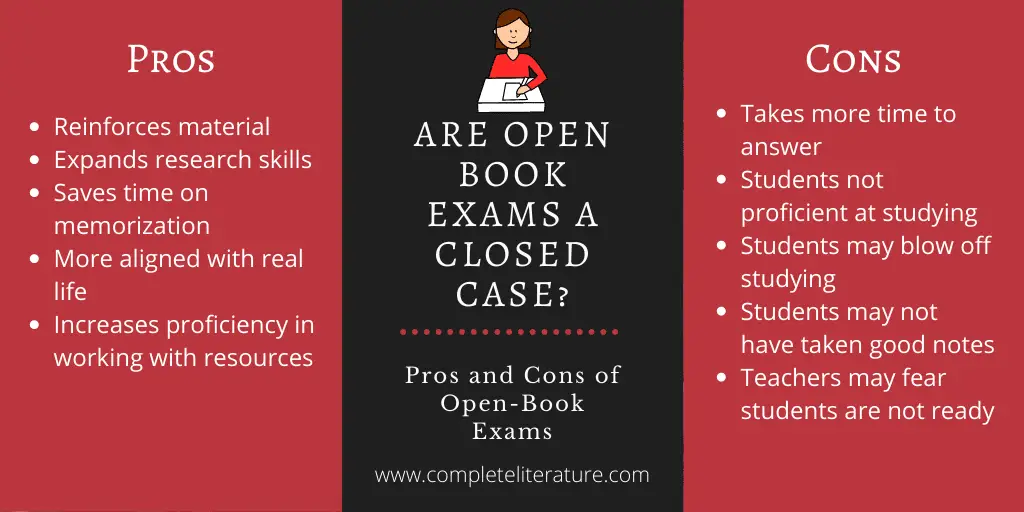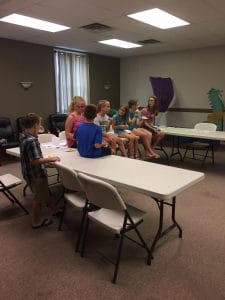When I was in school, open book tests were my jam. I had a pretty photographic memory. I studied for tests by remembering where things were located in the books or worksheets. Then I could remember the words based on where they were located on the pages. So an open book test made that process even easier. I could literally remember just about every place I had read or studied something, so it was super easy to find it and answer in an open book exam. I now realize not everyone has that advantage.
So, what exactly are the pros and cons of open book exams? Open book tests can teach students to efficiently reference any information that they don’t already know off the top of their head. They can also reinforce what students have already read and learned as they go back through the texts to find answers to the test questions. And knowing how to access information is almost always more valuable than knowing facts themselves. Finally, they enable students to concentrate on truly understanding the material rather than rote memorization of facts that they will forget as soon as the exam is over.
But then, as with all things in life, everything has its pros and cons. While I believe there are more pros than cons regarding open book exams, I will go over them here and let you decide. But before we do that, I would like to define exactly what an open book exam is.
Table of Contents
What Exactly is An Open-Book Exam?
An open book exam is one which students are allowed to bring their notes and textbooks along with them to look up any information that they need to answer all of the test questions. They could also use other forms of resources, but the most common ones are their textbooks and notes.
I read in an article some time ago that America is virtually the only country that regularly uses open-book exams for their upper level students–usually starting around 6th or 7th grade. I considered that a very interesting fact and would love to do some research on reasoning and results among various other countries in their educational systems. I do know after doing a cursory online search that several countries’ school authorities are discussing the practicality/usefulness of open-book exams.
So with an understanding of exactly what constitutes an open-book exam, lets go ahead and explore some of the pros and cons of using them in schools.

Pros of Open-Book Exams
The following are some of the most talked about benefits of open book exams that I found when researching but also experienced in my own school settings, both as a student and a teacher.
Reinforcement of Material Students are Learning
When students are taking tests that do not allow them to use their books and notes, they are relying solely on memory. While that is fine for some exams (for example, times tables or basic facts that must be memorized anyway), it can also be of great detriment to the student to rely only on their memory.
Allowing them to take an exam with their notes and textbook in hand allows them to go back through material they have already read. According to Lev Goldentouch, PHD, on KeyToStudy.com, it generally takes about 7 times to read something before you will remember it well. Unfortunately, not many students will have time to read all of their assignments 7 times in order to learn them well enough. Even fewer would be willing to spend the time to read their assignments 7 times. They would probably rather not know!
However, when you consider that the students will read the assignment (assuming they do their homework!), then talk about it in class, do related homework assignments, possibly do a report, and maybe even a peer discussion on it, they are now pretty close to the seven times they need to apply it to be able to remember it well and long.
Taking an open-book exam could very well be the last exposure they have to the material that allows them to learn the lesson in a way that allows them to retain it for a lifetime. And going back to deliberately find particular information is going to help students retain that information better already because it isn’t random information they are taking in anymore.
Expanded Research Skills
While students will most likely be taught research skills in their library classes (and in younger grades such as elementary and middle school), this is one of the perfect ways to master it.
Encouraging students to use exam time to go back and show mastery of the resources they have by looking for specific items is a great way to teach them how to learn and master concepts as an adult. They will use those techniques for literally their whole adult life.
One way that teachers can encourage this practice is by asking difficult questions about concepts that students will certainly not be able to answer without having to go back to their texts and notes. That enables the students to do the following:
- Remember the circumstances surrounding the information they are trying to find.
- Try to remember visually where it was found. Spatial memory can be very strong.
- Remember the information they are trying to search for by keeping it in the front of their thoughts while they search for it.
All of this helps them to cement what they are trying to learn in their heads. And then when they find the information they are looking for, it is the final piece of the puzzle that makes everything fit together. Having the whole picture is a huge step in mastery of a concept.
Save Time on Studying to Memorize Facts
There is a definite need to memorize facts in order to retain them for life. But that is something that generally happens in the preschool, elementary, and early middle school years. Things such as the alphabet, days, months, years, addition, subtraction, multiplication, and division facts, etc. are all things that need to be memorized and pulled up by memory instantly.
But as students get older, the information is not so cut and dry and unrelated to everything else. So the method of learning and retaining that knowledge must change.
And that brings us to our next point.
More Aligned With Real Life
Switching gears from rote memorization to research and building on concepts is a huge part of succeeding in the world. And starting that process in middle school is perfect timing. It allows your students to learn it before it becomes too intimidating to them. With plenty of practice and classroom discussion and examples, they become comfortable with it at an early age. The more they do it, the more second nature it becomes. And then it follows them into their adult years. What an amazing tool they will have!
This is something they will use in their home life, when trying to figure out how something works or how to repair something. It will be useful in their jobs, where their manager gives them something to do and they have to research it to figure it out and then put out their best work. It will be necessary to use when they are raising their children and have no idea what to do with them!
And fortunately, we know there is no shortage of resources online, in books and among our friends and family that will help us to learn those things. Harnessing this ability at a young age will prepare your students to be able to do almost anything they can dream of as they become adults. If that isn’t the definition of well educated, nothing is!
Shows Proficiency in Working with Resource Materials
The only way to really learn proficiency with resource materials is to get your hands dirty and keep on going until it becomes a natural step to finding the information being sought.

My Experience as a Student
I remember as a 6th grader going to the library for a research paper. I have no idea now what the subject or topic was. My guess is that it was something science-y. What I do remember was going to the back wall of the library where all of the resource books were. I looked in a couple of encyclopedias, but the information was sparse and not enough to finish my report.
So, I hesitantly walked over to the Encyclopædia Britannicas. Keep in mind that I love to read anything I get my hands on. But when I opened up the appropriate volume and found the information I was looking for, I was so incredibly intimidated by the information I found. It was probably about 10 pages long. And the vocabulary was way beyond my 11-year-old brain capacity.
I sat down at a nearby table with my encyclopedia and folder with assignment in hand. And I sulked for about 5 minutes. I was so angry about that assignment that I knew I could not possibly do and keep my nearly perfect grade where it needed to be.
And then I opened the encyclopedia back up and started with the first paragraph. That turned into the first section. And then it went on from there. Once I broke it down, it was no longer too hard for me.
I actually became excited because for the first time I realized I could do it! And all of a sudden it was no longer beyond my reach.
Applying My Experience to Open-Book Exams
It is the same way with open-book exams. They are intimidating to the middle schooler who has to find one piece of information to answer a question. And they have to sift through 50+ pages of text plus their notes for the past several weeks.
But practicing it in class and then using it for an actual open-book exam will become exciting and rewarding once students realize how to use it as a tool.
Cons of Open-Book Exams
There are a few cons that have come up. Many of them can easily be worked around. I will let you read about it, then you can weigh in on your own thoughts after.
Can Take Students Longer to Find Answers
I can’t argue with the fact that it will take students significantly longer to finish an open-book exam with deeper questions than it would for an exam that has multiple choice, matching terms, true or false, or short answer questions.
But just like the saying “you get what you pay for,” you also get much more out of a test that you had to invest more work into. As a student, having to dig deep to remember where that paragraph was located that you are now looking for can bring so many other things to mind. And this is great for remembering the whole picture.
The trade off here is that you still have the same amount of time to finish the test–one class period. So instead of 100 multiple choice questions, you may get 20 research questions or essay questions instead. But you have more ability to answer them in a way that earns you more points rather than being only right or wrong.
And the bottom line is, while it takes longer to find the answers, you don’t have as many questions to answer.
Students May Not Be Proficient in Research Skills
This should really not be an argument because students should be taught these skills in the classroom from older elementary/early middle school on. And there should be enough classroom practice that the vast majority of students should be proficient at it by the time it comes to taking an open-book exam.
If you find that your students are having difficulty with this concept, having a quick refresher on it would definitely save you time in the long run. It would be better to take out a period or two from your normal schedule to work on these concepts so that they will be well trained in such an important concept.
Students May Blow Off Studying
There is a very definite possibility that some of your students will not bother to study at all for the test. They will think that since they will have all of the resources with them that they don’t need to do anything to prepare. They will quickly learn that this is not the case.
And honestly, maybe that is okay that they have that one time and blow it. It will teach them what they have to do next time to do a good job. And maybe one more review period to get the technique down will help them to pay more attention and realize that this is important for them to master.
If some of your students continue to have difficulty in this area, you could always sit down with them and ask them if they need help. Working through it with them would be one of the best things you could do.
Students May Not Have Taken Good Notes
Unfortunately, you cannot necessarily force students to write great notes. Some of them may never pick up on the right cues. But what you can do is straight up tell them when you are covering an important concept. Saying, “write this down because it’s going to be on the test,” is something I heard teachers and professors stress all the way through college.
Besides warning them that they need to take note of what you just said, it will also bring them back from daydreaming or other distractions that may have grabbed their attention. So they are getting added benefits!
While that is helpful, the truth is that some students just never really catch on to the right cues, no matter how well you try to word it. Unless, of course, you are point blank telling them what notes to take.
An alternate method here could be to give them a copy of notes that they will need and actually go over those notes with them. Then at least they have been exposed to that information and can manage it better in an open-book exam environment. And if it is a small group of students, it allows for more classroom discussion, part of those 7 times that helps facts stick in their memory!
Teachers Fear Students Will Not Have Mastered the Material
This was also a point that surprised me. If you have assigned the reading, read the material in class, discussed the material in class, assigned work related to it, reviewed it, and gone over notes while preparing for the test, they should have pretty much mastered the material.
For those students that learn on a slower curve, you can spend a bit more time on a focus group with them. And you could even help them with where to find certain concepts in the textbook or notes so that they will more easily find it when they need it.
It is not really doing the work for them. It is exposing them to it one or two more times for the sake of making it easier for them to find when they need to. After doing this a few times, those students will be ready to fly on their own! And you will be satisfied with a job well done.
It Could Encourage Plagiarism
I have to admit, this thought never entered my mind until I did some research on the pros and cons of open-book exams. I just figured the students were answering the questions as required. What I didn’t think about was that if they are copying the text verbatim as though it is their answer, then it is considered plagiarism.
This is a super easy problem to work around, though. Either the student needs to translate the text to their own explanation/answer on the test. or give credit to the author/book that they copied the text from.
One or two mentions of this and maybe a note on the board for a short while should be enough to take care of this concern. If it ends up occurring, you can directly warn the student(s) who did it. I would doubt they were thinking of it as plagiarism. They are just trying to get through the test with the right answers to get the best grade they can. Explaining the easy solution to them should take care of the problem very easily.
Conclusion
So this is the information that I have found and experienced in the pros and cons of open-book exams. I think that it is one of the best tools for learning in a classroom or real-world setting.
And as I researched it, I have found that it is a staple in classrooms across America and in discussion as a possibility around the world. I don’t believe it is going away as a valid testing method anytime soon.
What do you think? Is it something you have capitalized on in your classroom or homeschool? How has it worked for you?
If you enjoyed and found value in this article, I think you will also love the following articles:
Did My Student Copy and Paste? Here’s How to Find Out
How to Write CLEAR Test Instructions With 6 Examples
Encouragement for Those Who Will be Homeschooling Through Covid 19
How Many Questions Should be on a Test?





I used to have a professor at college that will let us see the book for 2 minutes in final exams.But, what is 2 minutes do when you have a big exam?
I had a teacher in junior high that did the same thing. It was actually more frustrating than productive for me. I would try to look at a few pages and remember what they looked like rather than try to remember random facts. I thought maybe I had more chance if I could recall what was on the page.
I always loved open book exams when I was in school because it took the stress off of over studying, but could see how it could make some people slack off on the studying. This was pretty interesting.
Kileen
cute & little
I agree, fully, Kileen. Studying for open book was still necessary, but so much easier for me.
While I can see some kids abusing this type of exam, I think in the long run it’s a better option. It’s more like real life. I don’t memorize everything. If I need to know something, I research it.
Exactly, Brianne. It wouldn’t make sense for us to memorize everything we do. Our brains really don’t work that way. It’s so much better to have resources at our disposal.
For me it is very hard to find out the answers from an open book at the exam time
I am sorry, Bindu. I wish that some of your teachers could have worked through that with you.
I pretty much loved the open-book exams when I was in school. At least, it made me more confident to take the exams.
Nevertheless, there is always at least a reason behind anything, so does this. An open-book exam usually contain a mass knowledge which hardly for students to remember everything. So that could be a big drawback which scare the student.
I agree. I used to study the pages, even with large material, so that I would be able to dig in better on test day. As long as I knew where all of the subheadings and topics were, I could usually maneuver my way around, even with a lot of material covered. As time went on, it became a game for me.
Your analysis is spot on! I always thought open book exams are more aligned to real life situations. But sometimes teachers used to make them especially hard to make up for the fact that we have our materials with us. No need for that. I would also encourage open internet exams now as it is so important for our kids to know how to filter all the info out there (here 🙂 on the Internet. A great post.
I fully agree, Stella. No need to make it so difficult just for the sake of difficulty. It is a tool for learning, not an opportunity to needlessly trip kids up.
I don’t remember having an open book exam when I was still studying. But thanks for analyzing.
I’m having a dilemma with the pros and cons because they both have a good points. Well, good job for sharing this!
That is very true, Gervin. Thanks for sharing your thoughts. 🙂
I remember open book tests. HOWEVER – I don’t feel like they were any easier AT ALL. You still have to read the book prior to the test to know where to find the information!
Haha, that is a true statement! I did love that I could always find the answer and I wouldn’t lose points based on not being able to come up with something in my head!
such exams were my favorite. being an it specialist I always had google up my sleeve so if I didn’t know anything it was my job find it was. I think this for exam helps a lot for future
It all depends on the individual learner involved, but I think it would deffo help in the future world of exams x
I remember my open book exams. They were difficult because of the type of questions. And you still have to do the work to know where to find the answers in a short amount of time. But they were always my favorite!
I rarely had open book exams coz I came from a strict Chinese school but I would guess that there really are a lot of pros that need to be considered.
Hmmm… I remember having teachers that let us take open book exams, but they always seemed to backfire. People wouldn’t study and then they spent way too much time looking for answers in the book and bam…. no more time. It sounds like a good way to take a test but in reality, maybe not?
Learning and knowledge retention really varies. It’s good that open-book type of exam encourage children’s research skills. Mastering this definitely helps them as they move up levels as well as in their future careers.
I had a lot of open book exams through school and for the most part really enjoyed them. They were always used when an exam was essay format and we would use open book to reference etc. Definitely took a lot of the test anxiety away too
Great share!
have also had a few times these open book exams they are really very beneficial according to me..indeed glad you analysed it more…
I think that memorizing does not help at all; it is better to analyze and understand each situation. repetition is better than learning; it makes the brain connect and explore better
Great article! I love your points about open book tests taking longer, but the pro is you will not have as many questions. I believe its a great way for students to build up their research skills
I experienced Open-Book Exams. It’s funny because the answers are not in the books! It’s a psychological thing that makes you want to study more as it will be more difficult. Also, it teaches you to be more disciplined!
I love this! Thank you! And I love the title! So clever!
Thank you! I got the title from my favorite keyword analyzer!!
Wow! What an informative post! I have no experience with open book exams, but as a student I used to take good notes 📝 😊
That is quite an interesting topic. This is quite helpful especially for teachers nowadays. I’ve always loved open book exam though I also believe that we don’t rely on this type of exam.
Oh my….I am speechless! I just can’t…..like, how did I not know about these exams existing, when I was still in school? Exams would have been so much more fun.